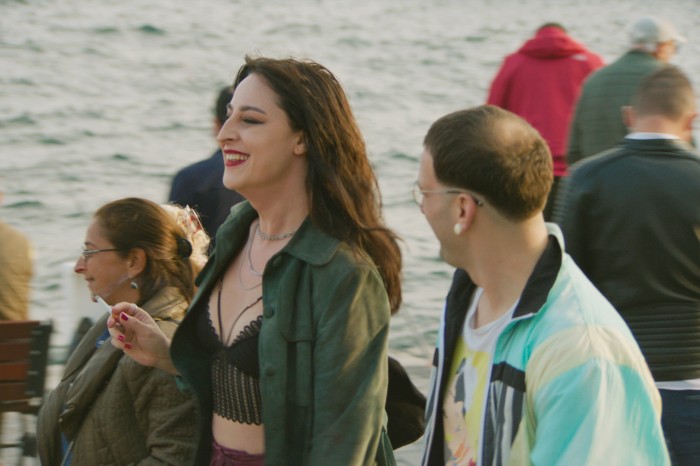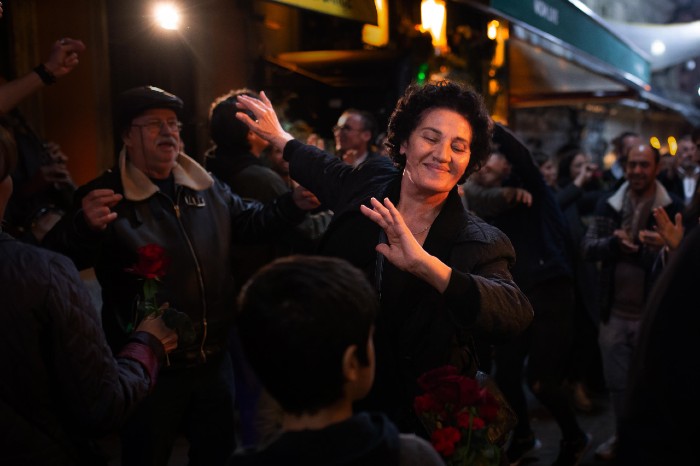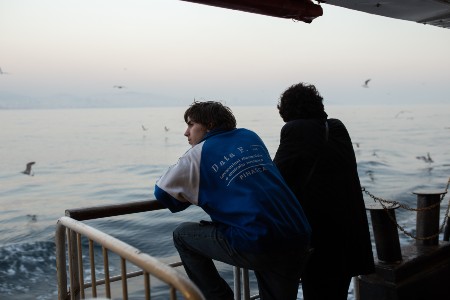Written and directed by Levan Akin, Crossing, opens as a moving exploration of identity, family, and the transformative power of personal journeys. Premiering in the Panorama section at the 2024 Berlinale and later showcased at the BFI Flare Film Festival, the film not only captures the complexities of the 2SLGBTQ+ existence in conservative places like Georgia and Turkey, but also reveals the intersections of – and contention between – tradition and modernity. Akin’s latest film resonates deeply with its compelling narrative and remarkable visual storytelling.
The film follows Lia, portrayed with remarkable depth by Mzia Arabuli, who embarks on a journey from Georgia to Istanbul in search of her estranged trans niece, Tekla. Lia’s character is imbued with a stoic determination that belies a deep-seated emotional vulnerability. On a personal note, I truly appreciated Arabuli’s performance as both commanding and nuanced, showcasing a woman at the crossroads of resignation and rediscovery. Her ability to convey strength, vulnerability and tender moments, deeply moved me. I wholeheartedly agree with Akin’s comparison of Arabuli to the great Anna Magnani.
The supporting cast, including Deniz Dumanli as Evrim, a trans woman and lawyer, adds significant depth to the narrative. Dumanli’s portrayal of Evrim is both compassionate and empowering, embodying the resilience and solidarity that the film celebrates. The interactions between Lia and Evrim, and the broader trans community, highlight the personal and political struggles faced by those living on society’s margins.
Lucas Kankava as Achi, the young man who goes to Istanbul with Lia to help search for her niece, is pivotal to the film. A bond forms between these two characters throughout their journey, which keeps one engaged and invested from start to finish. There is great chemistry between Arabuli and Kankava here – they really become more like family as their journey progresses.

It is important to mention Akin’s decision to set Crossing in Istanbul. This is not only a geographical choice but also serves as a narrative strategy that adds layers to the film’s themes. Istanbul, with its dichotomy of worlds and vibrant street life, serves as a living, breathing character in the film. The city’s streets are more than just backdrops; they are symbolic of the intersecting lives and hidden struggles that many navigate in this world.
The cinematography, led by director of photography Lisabi Fridell, aptly captures Istanbul’s beauty and contrasts. The bustling street scenes are great visuals, alive with color and movement. Fridell’s camera work balances the buzzing energy of the city from day to night with intimate, contemplative moments. The sequences set in the more queer-friendly neighbourhood, in particular, reflect the diverse realities of Istanbul’s marginalized communities.
There is a lot to discover about the city and its inhabitants from a few scenes. One standout scene involves Lia and Achi’s journey through the labyrinthine streets of Istanbul while searching for Tekla. Here, Fridell’s use of natural light and some close framing takes us along this city that is both a refuge and a labyrinth. The contrast of traditional areas of the city with vibrant queer spaces highlights Istanbul’s duality, showing us the city’s as both suppressing and liberating.
The film’s portrayal of Istanbul is further enriched by Akin’s personal connection to the city, as reflected in his director’s notes. Akin’s intimate knowledge of the city, gained through his own experiences, gives Crossing its authenticity. His visual depiction of Istanbul’s contrasting worlds emphasizes the film’s broader themes of acceptance and transformation.

Crossing is a powerful and moving exploration of identity, family, and the search for acceptance. Levan Akin’s direction, Fridell’s cinematography and the entire production team, create a vivid, emotionally resonant portrayal of Istanbul and its inhabitants. The film succeeds in its ability to intertwine personal journeys with a broader socio-political context, offering a view of the human experience that is both universally relatable and deeply specific. With a standout performance by Mzia Arabuli and a visually stunning depiction of Istanbul, Crossing is, in my opinion, a standout in contemporary cinema, bridging the gaps between tradition, modernity, and the search for belonging.






